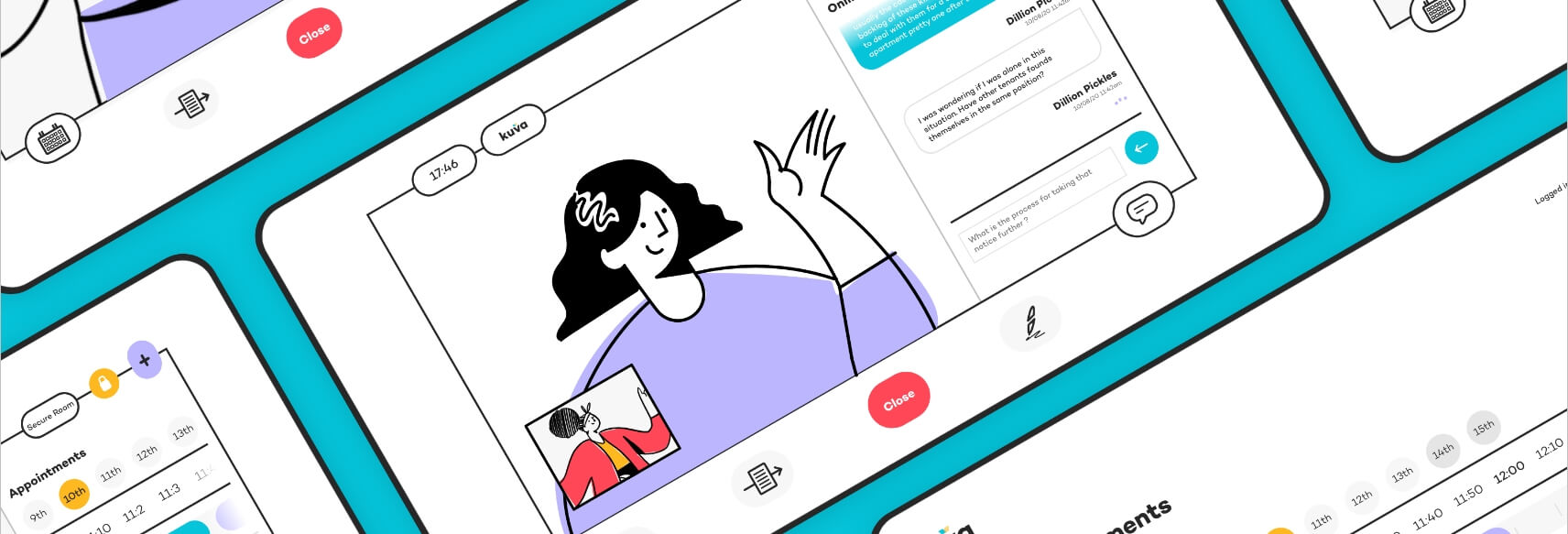In this post, we tell the story behind the design and development of Kuva – why we decided to build it, and why we built it the way we did.
Around two years ago, the team which would go on to create Kuva was setting out on a new research project. This was “Routes to Justice”, an Innovate-UK funded study of the potential uses for new digital technologies in the access to justice sector (aka, the system of charities and other organisations who provide free legal advice to people with limited means). Over the course of many months we built relationships with key agencies, interviewed advice providers and observed their working practices. In early 2020, we published our report, “Digital Technologies in the Access to Justice Sector: A Strategic Overview”, which outlined a range of technical interventions which, we believed, might support the sector in the future delivery of its mission.
One of these proposals was to create a secure, integrated communications suite for the delivery of confidential legal advice, enhancing the sectors’ ability to supply its services remotely whilst also fulfilling all relevant legal and ethical requirements. In the course of our research, we’d developed a clear picture of what advice providers would require from such a product:
Accessibility: ease of use for both providers and clients with differing requirements, compatibility with a range of platforms, minimal barriers to entry.
Sustainability: costs which are manageable in the long-term, an offering which can scale to meet changing needs, reliable technical support for users.
Professional Features: secure document transfer, appointment booking and notifications, waiting room and other features necessary for service delivery.
Privacy and Security: a system which safeguards the privacy of clients throughout their engagement with the platform.
Values: a service which helps advisors uphold their duty of care to their clients, and enables them to provide the highest quality of advice and support
As we surveyed the market in late 2019/early 2020, we concluded that there were no available products which fulfilled all of these requirements. The most widely used options were (and still are) “free at the point of use” offerings such as Zoom, Google Meet or Microsoft Teams. None of these tools are designed for the provision of confidential advice. Not only do they lack the full range of necessary features, they are also supported by a business model based on the monetisation of user data (see our blog, “Why Not Just Use Zoom?” to learn more). This meant that they could not, by their very nature, offer complete privacy and security for advisors and their clients. We believed there was space for a different proposition.
Then Covid hit. All of a sudden, organisations which had previously been in two minds about remote provision were forced to pivot instantly to new systems (for more detailed analysis of this, see our blog “The Future of Digital Services”), more often than not based around the use of Zoom et al. Our job had suddenly become a hundred times more urgent.
We secured emergency funding from Innovate to turn our specification into a working prototype, and then to spin this out into a company capable of offering it as a service. We had no illusions about the scale of the challenge ahead of us, but nevertheless, we were about to learn a whole lot about what it takes to build a secure and private communications system in today’s digital ecosystem.
We designed Kuva so that the only information the platform requires is the bare minimum necessary to set up a call. This data is encrypted, and is deleted from our servers as soon as it is no longer needed. Meanwhile, everything that is said or shared within the Kuva meeting room is completely inaccessible to anyone outside that room, including us!
The conversation is as private as if it were taking place in a
soundproof office. This is, we believe, the only way to engineer a video-communications system capable of upholding the professional obligation to protect client privacy.
However, digital products cannot be built in a vacuum. On the one hand, they must be designed to be used by real human beings, with differing needs and priorities; on the other, they have to work within a digital infrastructure managed by organisations who do not necessarily share the values of Kuva and its clients. Your program can have all the safeguards in the world, but if its functionality is woven into a wider system which does not guarantee the same protections, it cannot properly be called private and secure.
Your program can have all the safeguards in the world, but if its functionality is woven into a wider system which does not guarantee the same protections, it cannot properly be called private and secure.
This was the rationale behind designing an integrated communications platform – to avoid a situation where providers have to cobble together various products with differing privacy policies in order to get the functions they need, inevitably causing leakage as sensitive data passes between the separate parts of the system. As began building Kuva, however, we came to realise that we would need to carry this principle much further if we were to fully deliver on our guarantees.
When creating a new online communications service, it is the norm to rely on an established third-party service to supply the basic video-chat functions. These companies are experts at what they do; by taking care of this part of the design, they allow people like us to focus on customising our tool for our target user. This is how we always assumed we would proceed. However, as we engaged more deeply with the details of the systems on offer, we realised that using a third-party provider would compromise our very raison d’être.
Whilst it is true that the third-party would not have direct access to the contents of the call, their position as the facilitator of the digital connection meant that they held information which could potentially be used to trace the identities of the callers. To be clear, we had no reason to suspect that the third-party service would attempt to use this information, but it meant that our promise to guarantee client privacy and security was no longer our own. Our key offering was dependent on the policies of an external organisation, and if these were to change, the entire basis of our product would be invalidated overnight. The only feasible solution, we realised, would be to build our own video-communications system from the ground up.
This was a daunting moment, as I’m sure you can imagine! However, as our dev team warmed to the task, we realised that in deciding to go our own way, we had liberated ourselves to create the product precisely as we had envisioned it. It was now possible for us to build a system where data would not be transferred via unknown jurisdictions, or stored (even temporarily) on servers inaccessible to us or our customers. We would grant ourselves no access to the contents of our customers’ communications, and whatever data was required to establish the link between providers and clients would be destroyed as soon as it had served its use. In short, we would create an integrated digital communications platform capable of guaranteeing the privacy and security of all its users.
With this decision, we asserted our independence from the existing digital comms ecosystem. When you subscribe to Kuva, you are not simply purchasing a superior product; you are choosing to engage in a different kind of digital economy, one which is based not on the exploitation of personal data, but on providing sustainable digital services suited to the needs and values of their users. It is no longer necessary for remote service providers to expose themselves or their clients to digital tracking and targeted marketing – get in touch with us today to find out how.

